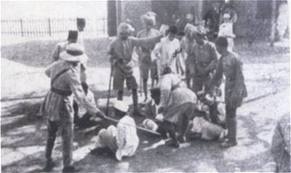India’s Freedom Struggle was not just an event but a phenomenon that came to light from time to time. In ancient times, people from all over the world were keen to come to India. The Aryans came from Central Europe. The Persians followed by the Iranians and Parsis immigrated to India. Then came the Mughals. Alexander the Great too, came to conquer India but went back after a battle with Porus. Hu-en Tsang from China came in pursuit of knowledge and to visit the ancient Indian universities of Nalanda and Takshila.Vasco da Gama from Portugal came to trade his country’s goods in return for Indian species. The French came and established their colonies in India. Lastly, the Britishers came and ruled over India for nearly 200 years.
Read Also: India’s National Flag
Timeline of India’s freedom struggle: A brief timeline of Indian freedom struggle from The early European when the East India company was formed (1600) to the freedom of India(1947) is as follows
The Early European
1498 – Vasco-da-Gama arrived in India.
1600 – East India Company was formed.
1748 – Anglo-French War in India.
1757 – Battle of Plassey (After the battle of Plassey in 1757, the British achieved political power in India.).
The East India Company
1799 – British defeat Tipu Sultan.
1805 – Anglo-Maratha War.
1846 – Anglo-Sikh War- Sikhs Defeated.
1856 – The British conquest and its authority were firmly established.
1857 – First Indian War of Independence.
The conquest of India, which could be said to have begun with the Battle of Plassey (1757), was practically completed by the end of Dalhousie’s tenure in 1856. It had been by no means a smooth affair as the simmering discontent of the people manifested itself in many localized revolts during this period. However, the Mutiny of 1857, which began with a revolt of the military soldiers at Meerut, soon became widespread and posed a grave challenge to the British rule often regarded as first among modern India’s freedom struggle. The revolt was controlled by the British within one year, it began from Meerut on 10 May 1857 and ended in Gwalior on 20 June 1858
1858 – End of East India Company (November 1, 1858, declared that thereafter India would be governed by and in the name of the British Monarch through a Secretary of State.)
Must Read: Partition of India 1947: A tale of turmoil
Indian National Congress and Modern India’s Freedom Struggle
1885 – Indian National Congress was formed by Allen Octavian Hume.
The Indian National Congress became the leader of the Indian Independence Movement, with over 15 million members and over 70 million participants in India’s freedom struggle against British rule in India.

1915 – Home Rule League was founded by Annie Besant.
1919 – Khilafat Movement, Jalianwala Bagh Massacre, The Rowlett Act.
1921 – Rise of Gandhi and his Civil Disobedience Movement.
1922 – Gandhi Suspended movement after the Chauri-Chura violence.
1928 – Murder of Lala Lajpat Rai and subsequent revolutionary activities.
1929 – Singh and Dutt threw a bomb onto the corridor of the assembly and shouted “Inquilab Zindabad”.
1930 – The Dandi Salt March, The Simon Commission, First Round Table Conference.
1931 – Second Round Table Conference, Gandhi-Irvin Pact.
1937 – Provincial Autonomy Begins with Congress winning power in many states. WWII breaks out and political deadlock in India.
1942 – The Quit India Movement, Rise of Subhas Chandra Bose.
1946 – INA men tried. Muslim League Adamant about Pakistan
1947 – India was Partitioned. Britishers Left India – Freedom at Midnight. End of India’s Freedom Struggle and beginning of Nation building process.
Don’t Miss:


Sir, I think you have forgot to mention 1906 (Surat Session) and 1916 ( Lucknow session) which are of utmost prominence in Indian National Congress History.
The complete struggle timeline is very effective and specially useful to recall the history..keep up the gud work.
Thanks Sr it’s good notes
thanks alot for giving such compact bunch of all incident for revise
Very useful nd summarised info
Very useful nd summarised information
Succinct,refreshing information.Good work.
Briefed n helped
It is a very helpful article but i feel the partition of bengal, swadeshi movement and revolutionary terrorism should also be mention in the freedom struggle of india
Overall it was a good attempt ..but as this page is looked forward by many aspirants ..mistakes have to be rectified.. In 1921 Gandhi was campaigning for Non coorporation movement not Civil disobedience movt (CDM) ..CDM is salt march of 1930
Twinkling Glimpse of five centuries, a wonderfully presented to us by you Shree Saish Ganjoo.
it is a good history